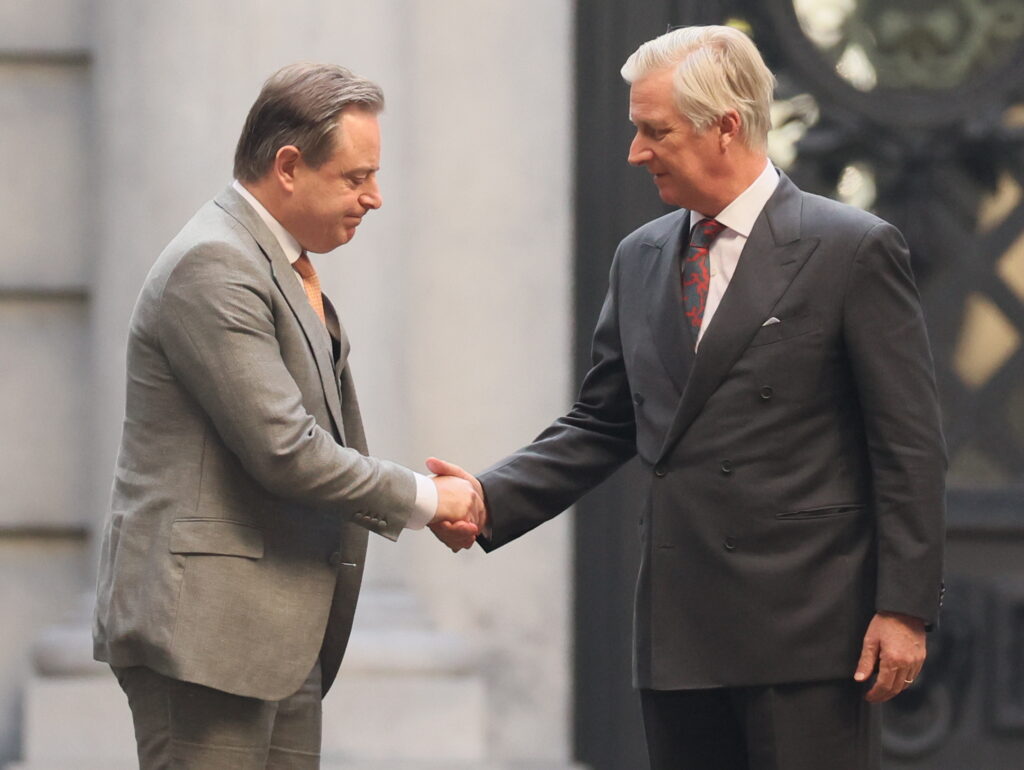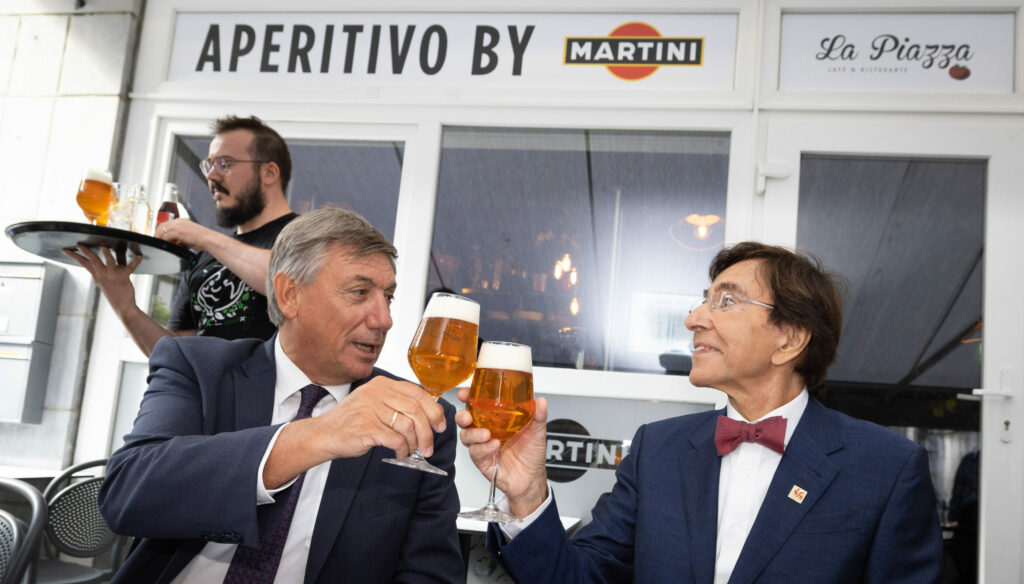The principle of self-determination is invoked in many contexts throughout the world. The Flemish nationalist party N-VA, now likely to provide Belgium with its next prime minister, is among its most consistent advocates. But does the principle require that Belgium should become a confederation? No, it does not.
Philosopher Philippe Van Parijs reflects on current debates in Brussels, Belgium and Europe.
A tricky principle
According to article 1 of the Charter of the United Nations, one of the organisation's key aims is “to develop friendly relations among nations based on respect for the principle of self-determination of peoples”. This principle has been used to justify many conflicts. For example, on 6 December 2024, in an interview with Tucker Carlson, Russia’s foreign minister Sergey Lavrov repeatedly referred to this principle to justify the secession of Crimea and the Donbas.
How tricky the application of the right to self-determination can be is dramatically illustrated by the Israeli-Palestinian conflict, where it is tirelessly invoked by both parties. But how is it supposed to apply to Belgium? This is not an idle question. As I write, Bart De Wever is likely to become the country’s prime minister. He happens to be the leader of a party – the Flemish nationalist N-VA – that has repeatedly asserted every people’s right to self-determination.
Belgium’s birth was not self-determination
No doubt to many Flemish nationalists’ satisfaction, the principle of self-determination could not possibly have justified the secession that created the Belgian state. In 1815, in the aftermath of the Battle of Waterloo, the southern provinces of the Low Countries were transferred from the defunct French Empire to the Kingdom of the Netherlands. They seceded in 1830 to form a new state with a new name – “Belgique” – until then used only as an adjective.
This secession was the successful outcome of a contingent coalition between the two main components of the provinces’ largely French-speaking elite: very roughly, liberal bourgeois who resented the authoritarian style of the Dutch King, and Catholic aristocrats who hated the idea of being the subjects of a Calvinist ruler.
The constitution that created this new state was adopted in 1831 by a national congress elected in November 1830. Only citizens who were highly educated and/or were wealthy enough to pay taxes had voting rights: 46,000 of the approximately 2 million adults living in Belgium at the time. Many of these, especially among the rural majority, probably only heard about the secession, if they did at all, long after it had become a fait accompli.
No one invoked the principle of self-determination at the time because it only emerged with Wilson and Lenin in the aftermath of the First World War. And no one could seriously have done so: claiming that it was Belgium’s “people” that exercised, by seceding, its right to self-determination would have been sheer nonsense.
Confederalism as self-determination
Luckily, we now live in a more genuinely democratic country. Moreover, since 1994 when Belgium became a federal state, the populations of four territorially circumscribed, democratically functioning entities could conceivably be regarded as the “peoples” to which a right of self-determination could be granted.
Unsurprisingly, we can therefore read in article 1 of the Statutes adopted by the N-VA when the party was created in 2001: “In its quest for better governance and more democracy, the N-VA logically opts for the independent republic of Flanders”. However, self-determination does not entail national sovereignty. The plan for a confederal Belgium, adopted by the N-VA in 2014, is meant to offer a more realistic implementation of the principle than the partition of Belgium into two or more sovereign states.
The key building blocks of the N-VA’s confederal model are the nations of Flanders and Wallonia, each with its own government and parliament. A basic treaty (grondverdrag) ratified by the two parliaments would replace Belgium’s constitution (grondwet) and specify what the two nations decide to do together, and how.
The two “national” parliaments would each choose three ministers, who would together form a confederal mini-government in charge of the confederation’s remaining competences. For the other responsibilities, following the EU model, a council of ministers would gather the Flemish and the Walloon minister in charge if and when cooperation was needed, and the top confederal organ, the Belgian Council, would consist of the minister-presidents of the two “nations”.
Self-determination for East Belgium
What follows from the principle of self-determination for Flanders and Wallonia is therefore pretty straightforward. But federal Belgium contains two more territorially circumscribed entities. What about Ostbelgien and Brussels?
The German-speaking Community, now commonly called Ostbelgien (East Belgium), is a set of nine municipalities totalling about 80.000 inhabitants in the far east of the country. Isn’t that too small to form a people? Not according to the N-VA. In an interview with Ostbelgien’s daily newspaper (Grenzecho, 13 May 2019), Jan Jambon (N-VA), then soon to become minister-president of the Flemish Government, declared: “We are in favour of the right of self-determination, and the German-speaking Community must therefore formulate itself what it wants.”.
A few months later, this position was endorsed by the federal deputy Sander Loones, who designed the N-VA’s “confederal” model: “The German speakers will be able to determine themselves their institutional future within Belgium. If they want to be a fully-fledged region like Flanders and Wallonia, they can be it without any problem” (Grenzecho, 14 December 2019).
However, given Ostbelgien’s modest demographic weight, the N-VA’s model does not go so far as to entitle it to a seat in the confederal government, and its minister-president would only be invited to the Belgian Council if and when the agenda justified it. Less neat, but still consistent enough.

Eupen, the capital of Belgium's German-speaking Community. Credit: Belga
No self-determination for Brussels?
How the N-VA applies the principle to Brussels is quite a different matter, as explained by Jan Jambon in another interview, this time with the Flemish daily De Morgen (2 November 2013). According to the N-VA, the journalist noted, Flemings, Scots and Catalans could decide for themselves whether to become independent, no matter what the rest of their country thought. Why not Brusselers too?
“If you read our constitution”, Jambon answered, “you will see that the country is bipartite and consists of Flemings and Francophones. The Brusselers are part of those two democracies… For me, the Brusselers are not a people, a nation.” What is a people? the journalist then asked. And Jambon answered: “If you have the will to form a people, then you are a people. Brussels is a mishmash of anything and everything [een versnippering van van alles en nog wat].”
One can quibble with Jambon’s reading of the Constitution: its article 1 does not say that Belgium is bipartite but rather that it is composed of communities and regions – including Brussels. However, one cannot honestly dismiss his characterisation of Brussels’ population. If a population only deserves to be called a people and to enjoy the right to self-determination if it displays a high level of cultural homogeneity, then Brussels has no claim to it.
What then is the N-VA’s confederal solution for Brussels? No collective self-determination for its population, but individual self-determination for its members. Brusselers are expected to define themselves as either Flemings or Walloons, with voting rights for the Flemish or the Walloon parliament respectively, and with social rights and fiscal obligations derived from this choice.
Jambon seems to suspect that this solution is not exactly consistent with Brussels’ demographic reality: “It is true that Brussels is not only made up of Flemings and Walloons.” This is, to put it mildly, an understatement. At the time of the interview, two-thirds of the Brussels population were of recent foreign origin. Today, more than three-quarters are.
To be fair, the N-VA’s leadership is gradually acknowledging that this way of handling Brussels in their model is unworkable. In a column published by the main Flemish-nationalist media (Doorbraak, 13 July 2021), former senate president Siegfried Bracke (N-VA) writes: “The ancients [within the N-VA] swear by the Flemish-Walloon model, where Brussels is their shared competence. Others [the moderns] see that reality has evolved in the meantime: the Brussels identity exists, and, they say, it is precisely nationalists who need to acknowledge it.”
In which camp does Bracke believe Bart De Wever is? “In the camp of the moderns. If not already out of conviction, then at least out of calculation: that ‘solution’ is feasible; the others are not.”

Bart De Wever, president of the officially separatist N-VA, meeting King Philippe as prospective Belgian prime minister, 04 November 2024. Credit: Belga
Confederalism as vetocracy
On this more defensible interpretation of the notion, a “people” does not need to be a linguistically and culturally homogeneous nation or ethnos. It can just be a demos, a territorially circumscribed population that shares political institutions and has developed a sufficiently strong common identity. Brussels can then claim a right to self-determination equal to that of Flanders and Wallonia.
Does it follow that the future of Belgium must lie in a tripartite confederation? Not at all. Confederations are intrinsically precarious for a fundamental reason well explained in one of the documents that played a key role in transforming the United States from a federation into a federal state. Federalist Paper n°20, published by James Madison in 1797, stigmatised the “imbecility” of the “Belgic confederacy” (as the northern provinces of the Low Countries were sometimes called in the 18th century) and argued that any confederal arrangement, being based on a unanimity rule, is a recipe for a paralysing vetocracy. A bipartite Belgian confederation would be bad enough. A tripartite one would be even worse.
What must guide us when designing political institutions in general, and those of ethnically diverse entities in particular, is not a dogmatic commitment to every people’s unconditional right to self-determination. It is rather a concern to allocate competences between different levels of government and to design the exercise of power at each of these levels in such a way as to best achieve fairness and efficiency.
This requires granting a high level of autonomy, within their respective territories, to culturally and linguistically distinct peoples; not, however, by virtue of a fundamental principle of self-determination that trumps everything else, but as a sensible implementation of a wise principle of subsidiarity.
Self-determination against confederalism
This autonomy can be understood as guaranteeing each level of government and the corresponding demos – from the region to the EU – some right to self-determination. But such a right is worthless if it is not matched by a capacity for self-determination. And this capacity is not well served by political institutions that create an arena for diplomatic relations between separate peoples characteristic of a confederal vetocracy. It is best served by political institutions aiming to create the agora for joint deliberation constitutive of the demos of a well-functioning democracy.
The design of Belgium’s federal institutions can certainly be improved. But reforms should not endeavour to make these institutions more confederal than they already are. They should rather strengthen the Belgian demos by introducing a country-wide electoral constituency and strengthen the Brussels demos by abolishing the current “confederal” formula for the formation of the Brussels government.
Hence, yes, peoples’ collective self-determination matters in a culturally diverse polity, but once the ethnic conception of a people is dumped and once the capacity for self-determination is paid the attention it deserves, it does not justify confederalism, let alone partition. Quite the contrary. Certainly in Belgium. Perhaps also elsewhere.

